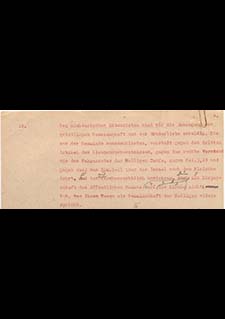On the Exegesis of the Fifth Commandment
The Breslau Synod’s guide stressed just as clearly that congregations owed their fellow Christians of Jewish descent spiritual communion and fellowship. The synod thus distanced itself categorically from laws that had been enacted in regional churches dominated by German Christians. The Thuringian church, for instance, excluded so-called non-Aryan Christians from the communion of the church on December 29, 1941:
Persons to whom the provisions of sections 1 and 2 of the Police Decree on the Identification of Jews of Sept. 1, 1941 – Reich Legal Gazette I p. 547 – apply are excluded together with their offspring from every church community in the territory of the Thuringian Evangelical Church. (Hermle, Thierfelder, Herausgefordert, 654)
The guide was adopted unanimously with one abstention. According to the synod’s resolution, it was intended to serve elders and pastors as a bearing and fortification.
The excerpt from the text provides insight into the development of Point 18 of the statement. The adopted version in which the handwritten revisions were incorporated, reads:
We owe it to non-Aryan fellow Christians to bear witness to spiritual communion and charity. Excluding them from our communion, violates the third article of the creed, the right understanding of the sacrament of holy baptism, Gal. 3:28 and what Rom 9–11 teaches about Israel according to the flesh. It is also invalid according to church law; for the church may not do anything as a statutory corporation that is inconsistent with its nature as a communion of saints. (Hermle, Thierfelder, Herausgefordert, 667)
Source / title
- © Evangelisches Zentralarchiv in Berlin, Best. 50 Nr. 616

